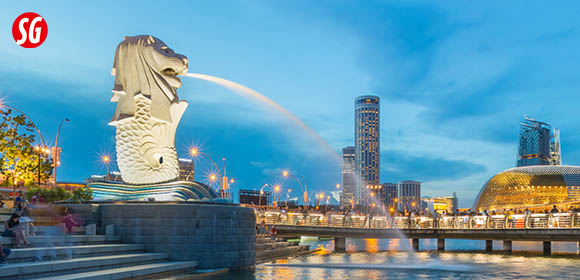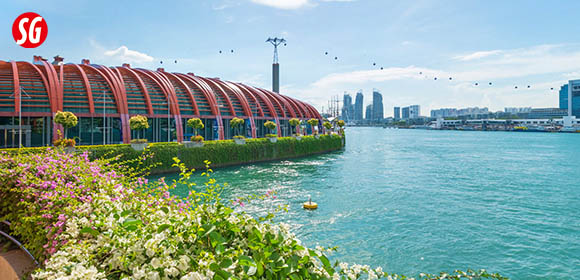
Singapore is one of the most economically developed countries in Asia and was once known as the “Four Asian Tigers”. It has a beautiful environment and a thriving tourism industry, with Marina Bay, Sentosa Island and other resort areas. Singapore is also known as the “Garden City”.
Two Major Resort Areas
Marina Bay and Sentosa Island are two of Singapore’s most famous resort areas. Reclaimed from the sea, Marina Bay is home to iconic landmarks such as Merlion Park, Marina Bay Sands, Gardens by the Bay and the “Grand Durian” Esplanade, making it one of the most popular tourist destinations in Singapore.

Marina Bay
Urban Miracle by Reclamation
In just half a century, the reclaimed Marina Bay has produced one miracle after another: the Marina Bay Sands, Merlion Park, the ArtScience Museum, Esplanade, and the skyscrapers form Singapore's unique city skyline.

Merlion Park
National Symbols of Singapore
Merlion Park is the most popular tourist attraction in Singapore and features an 8.6-meter high statue of the Merlion. This national mascot Merlion statue, along with Marina Bay Sands and the Esplanade, forms the city skyline of Singapore's Marina Bay.

Marina Bay Sands
6 Billion Luxury Experiences
Marina Bay Sands is Singapore's prestigious resort and leisure destination, featuring the Marina Bay Sands Hotel, The Shoppes, SkyPark Infinity Pool, Observation Deck, and ArtScience Museum, where guests can enjoy the world's finest luxury experiences.

Gardens By The Bay
Flowers and Giant Trees.
Covering an area of more than 100 hectares, Gardens by the Bay is Singapore's urban nature park with a collection of green plants from around the world. Gardens by the Bay has two glasshouses, the Flower Dome and the Cloud Forest, as well as landmarks such as the Supertree Grove and the OCBC Skyway.

ArtScience Museum
Arts Through Time and Space
Located at the foot of the Marina Bay Sands, the Singapore ArtScience Museum is shaped like a lotus flower in full bloom. The ArtScience Museum features the technology-inspired "Future World" exhibition, and from time to time hosts world-class traveling art exhibitions on a variety of subjects.
Manywhere Trivia:
Singapore’s nickname “The Lion City” comes from the legend of a Malay prince who met a lion here. The lion and the fishtail were combined to form the “Merlion”, the symbol of Singapore.
Singapore’s Sentosa Island is famous for its beaches, entertainments, shopping areas and hotels. The three scenic beaches on the island are more than 2 km long, and the Universal Studios Singapore, Water Adventure Park, S.E.A. Aquarium and other theme parks are family favorites.

Sentosa Island
Tropical Scenic Retreat
Sentosa Island is located in the southern part of Singapore's main island and is famous for its beaches, entertainment, shopping, and hotels. Sentosa Island is home to three scenic beaches and popular tourist attractions such as Universal Studios Singapore.

Universal Studios Singapore
Leap into the Movie Planet
Universal Studios Singapore is located on the resort island of Sentosa and features more than 20 attractions in seven themed zones, including Hollywood, The Lost World and Ancient Egypt. Enter the world of cinema at Universal Studios Singapore and embark on an unparalleled adventure.
History, Begins with the Singapore River
The Singapore River has been the trade, economic and financial center of Singapore since 1819 when Sir Raffles the pioneer landed on it. Today, the river banks are lined with historical monuments, city landmarks and bustling commercial centers.

Singapore River
History Began from this River
Sir Stamford Raffles landed by the Singapore River in 1819, started a new era. Since then, the Singapore River has been Singapore's trade, economic and financial hub, and today the river is lined with historic sites, city landmarks, and bustling commercial centers.

Clarke Quay
Colorful Riverside Pubs
Originally a small pier for loading and unloading goods along the Singapore River, Clarke Quay has become one of the most famous commercial districts in Singapore. After nightfall, people gather at Clarke Quay to taste the world's cuisines and party all night long in the nightclubs and bars.

Asian Civilisations Museum
Linking Asia and the World
Located at the mouth of the Singapore River, the Asian Civilisations Museum focuses on the study of Asian culture and art. Through thematic exhibitions on Trade, Faith and Belief, and Materials and Design, the Asian Civilisations Museum showcases Asia's glorious years in world history.

Victoria Theatre And Concert Hall
150 Years of Performing Arts
The Victoria Theatre and Concert Hall in Singapore have been in existence for over 150 years and were originally two relatively separate buildings, linked by a 54-meter tall clock tower and connecting corridor. It is the resident stage of the Singapore Symphony Orchestra, with dance and music rehearsal rooms.

Fort Canning Park
Urban Hilltop Historic Battery
Located on the north bank of the Singapore River, Fort Canning Park is a lush green park with many monuments. Historically, the British built forts and batteries at the top of Fort Canning Hill, and today you can still see the fort gates, the mottled walls and the British cannons in the park.

Old Hill Street Police Station
Building from Fairy Tale World
The Old Hill Street Police Station is located on the banks of the Singapore River, next to Clarke Quay. This six-story building was built in 1934 as a former police station and is currently used by government departments and art galleries. It is loved by sightseers for its white facade and colorful windows.
Multiculturalism, National Integration
Singapore is a typical immigrant country, where you will be greeted by not only Chinese but also Malay, Indian, Western faces from different parts of the world. The harmony of different races has fostered multiculturalism that Singapore is proud of.
Chinese Singaporeans constitute more than 70% of Singapore’s population, and Chinatown has been a Chinese settlement in Singapore for two hundred years. From street food to modern shopping malls, Chinatown is a perfect blend of historic sites and fashion.

Chinatown Singapore
The Shopping Street of Niu Che Shui
Since at least two hundred years ago, Niu Che Shui, the Chinatown, has been a Chinese settlement in Singapore. Today, Chinatown has not only preserved many historical monuments, but also has a perfect blend of fashion and trends. Come here to taste the food, explore the history, and experience the diverse culture of Singapore.

Chinatown Heritage Centre
A Portrait of Chinese Immigrants
Located in the busy commercial center of Chinatown, the Chinatown Heritage Centre recreates the livelihood of local Chinese in the early days, based on the 1950s Singapore Chinatown. The museum is a window to the history and culture of Old Niu Che Shui, the Chinatown.

Buddha Tooth Relic Temple And Museum
Buddha's Tooth and Pagoda
Singapore Buddha Tooth Relic Temple and Museum is a Tang-style Buddhist temple located in Chinatown, the Niu Che Shui area, famous for its collection of Buddha's tooth relics and numerous Buddhist artifacts. The temple is a treasure trove of modern Buddhist art, with the Hundred Dragons Hall, the Sacred Light Hall, and the Museum of Buddhist Culture.

Sri Mariamman Temple
Oldest Hindu Temple in Singapore
The Sri Mariamman Temple is the oldest Hindu temple in Singapore and it has a six-story high temple entrance tower with images of Hindu deities carved on it. Sri Mariamman Temple hosts various celebrations from time to time, such as the annual Timiti, the Firewalking Festival from October to November.
Flowers, temples, ornaments, food, spices… The Little India region provides everything that Indian Singaporeans need to live, and it is in this environment that they were born and raised, continuing to carry on the traditions and skills that their predecessors left behind.

Little India
Flower Accessories & Spicey Gourmet
The Little India area is the largest Indian community in Singapore, where you can eat authentic Indian food and find traditional Indian clothing, spices, jewelry. The Sri Veeramakaliamman Temple, built in 1881, is representative of the many Hindu temples in the area.
Not far from Little India, the Kampong Glam is a different scene. The carpets in Arab Street will surely make you admire the ingenuity of the local people, and every day the Muslims who live here walk into the magnificent Sultan Mosque for their daily prayers.

Sultan Mosque
Kampung Gnan's Faith Center
The Sultan Mosque in Singapore was founded in 1824 and the yellow domed building in the Indo-Saracenic style today was rebuilt for its centenary. The Muslims in the Kampong Glam area regard the Sultan Mosque as the center of their faith.
Attractions in Singapore
- Marina Bay
- Merlion Park
- Marina Bay Sands
- Gardens By The Bay
- Orchard Road
- Sentosa Island
- Universal Studios Singapore
- Clarke Quay
- Chinatown Singapore
- Chinatown Heritage Centre
- ArtScience Museum
- Singapore River
- Asian Civilisations Museum
- Victoria Theatre And Concert Hall
- Little India
- Buddha Tooth Relic Temple And Museum
- Sri Mariamman Temple
- Sultan Mosque
- Fort Canning Park
- Old Hill Street Police Station

































